Kant and the Freedom of the Will
At the University of Applied Sciences Emden I explained in a guest lecture how Immanuel Kant thinks about the freedom of the will and what he has to say to modern neuroscience, which in recent times denies the freedom of the will. Without presupposing any prior knowledge, I will first convey in this lecture the limits of our cognitive faculties according to Kant. Thereby it will become clear why statements about the freedom of the will made by natural sciences must remain at least doubtful. Subsequently, I explain how Kant justifies the freedom of the will despite these limits within the scope of practical philosophy. In order to gain more proximity to Kant's way of thinking, I do not only lecture about Kant, but read concise text excerpts from Kant's works with the audience, which I explain afterwards.
The lecture is illustrated by a presentation, with which I show Kant's argumentation in an intuitively understandable way. The lecture lasts, depending on possible questions, about 60 minutes; thus with a following discussion 90 minutes are to be scheduled. Here I present a highly abbreviated summary, readable in about 15 minutes, which presents the general line of argumentation. Below I show some photos of the university of applied sciences in Emden.
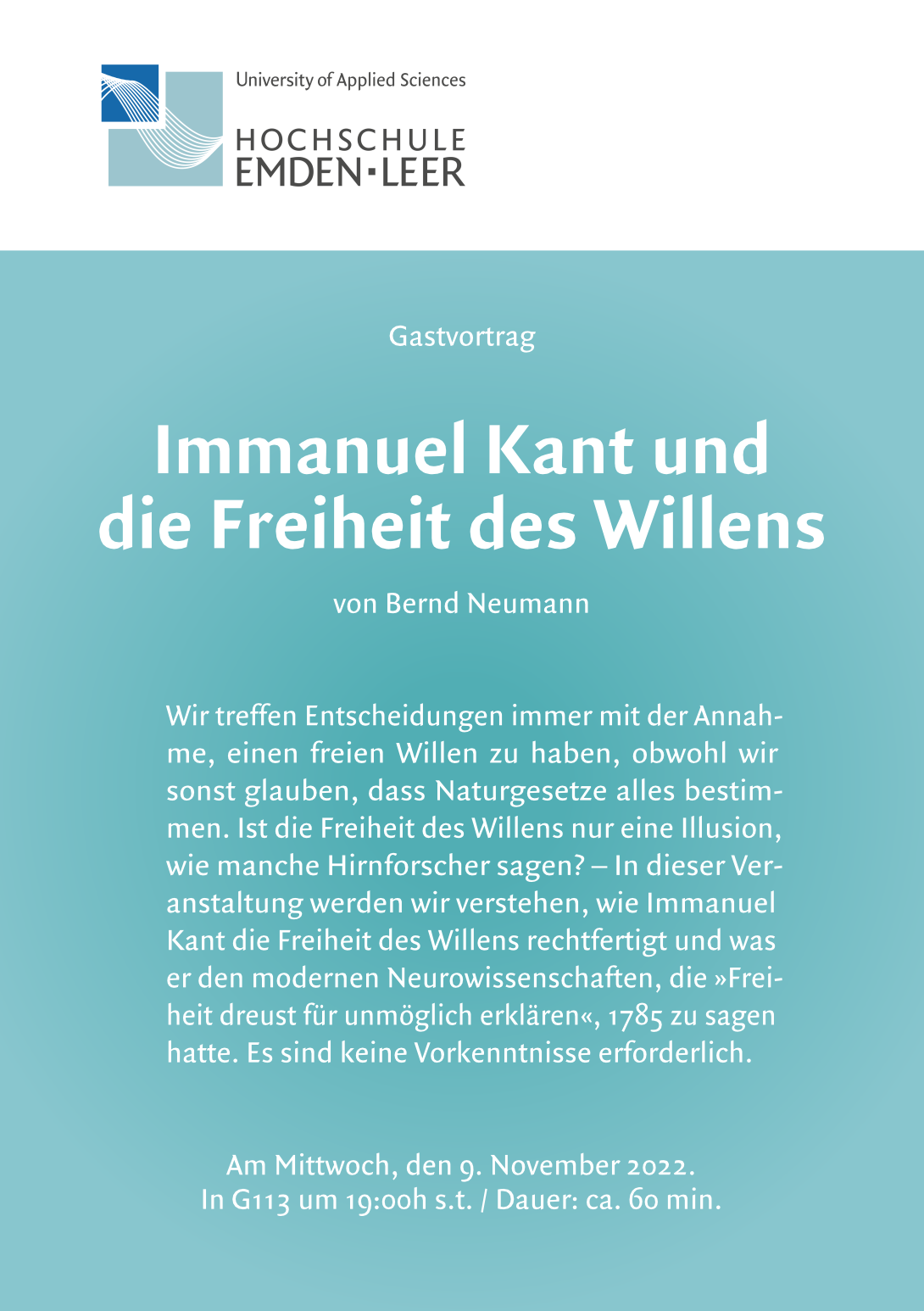
boldly declare that freedom is impossiblein 1785. No prior knowledge is required.
Summary
When we understand the world and especially when we explain it scientifically, everything happens according to natural laws: The stars in the night sky move according to natural laws, computers function according to natural laws, and also the functions of our body, even those of our brain, are determined by natural laws. However, as soon as we consider how we want or should act, we presuppose to have a free will, which is free
precisely because our decision is not determined by natural laws, but by ourselves. This seems to be incompatible with the natural laws of the world, and leads to the assumption that the freedom of our will could only be an illusion. This would have dramatic consequences, because without free will ethics is not possible and nobody could be held responsible for his actions.
In this lecture we will learn how Immanuel Kant reconciles the laws of nature with the freedom of the will, and how he justifies the freedom of the will as a prerequisite of all ethics. The lecture is structured as follows:
1. Immanuel Kant
Critique of Pure Reason. Theoretical Philosophy, Philosophy of Science.
2. The Thing in itself
and its Apperance
3. The Free of the Will: What we can know about it
Groundwork of the Metaphysics of Morals. Practical Philosophy, Ethics.
4. The Freedom of the Will: What we must think about it
5. Kants Answer to Neuroscience
1. Immanuel Kant. I will first briefly introduce Immanuel Kant and the works that are significant for this lecture. From the viewpoint of theoretical philosophy or philosophy of science, this is first the Critique of Pure Reason
from 1781. In its core, this is about four questions which human reason must necessarily ask itself, but which it cannot answer. One of these questions is about the freedom of our will. From the side of practical philosophy or ethics, we look at the Groundwork of the Metaphysics of Morals
of 1785. In this book, Kant establishes the categorical imperative as the highest principle of morality, and he justifies the freedom of the will as a necessary prerequisite of all ethics.
2. The Thing in itself
and its Apperance. We first look into the Critique of Pure Reason to understand the difference between the thing in itself
and its appearance. Kant explains that our conception of space and time can not origin in experience. For Kant, having a conception of space and time is a necessary condition for being able to recognize objects in the world of experience. These conceptions must therefore have existed in us before all experience, Kant calls this a priori. Therefore Kant speaks of space and time as conditions of the possibility of experience
(B37ff.).
This has a decisive consequence: If space and time are conditions under which our perceptions occur, then things must also be something independent of our conditioned perception. Kant calls this something the thing in itself
. Of this thing in itself
we can perceive nothing and know nothing more than that it somehow exists and must somehow be the cause of what we perceive from it as appearance in space and time with the senses. The relation of thing in itself
and its appearance is somehow a relation of cause and effect, but it must not be confused with natural causality, because natural causality exists exclusively between appearances.
The distinction of thing in itself
and appearance is also valid for our self: I can perceive myself as a being with hands, arms and legs, can also experience how I feel with an inner sense. As such, I see myself as an appearance in space and time and, as Kant says, as part of the world of senses. On the other hand, I have a merely thinking self-consciousness, which does not feel or look at itself under the conditions of space and time. As this purely thinking self-consciousness, as self in itself
, I think of myself as part of an intelligible world.
3. The Free of the Will: What we can know about it. In the Critique of Pure Reason, we are concerned with four questions that our reason necessarily poses to itself, but which it cannot answer. Kant contrasts contradictory answers for each question as thesis and antithesis. Both answers are based on a formally unobjectionable proof. Therefore Kant speaks of antinomies of pure reason
. The achievement of his critique is to dissolve these antinomies by showing that in the proofs
concepts are applied in an invalid way to objects outside the world of sense, which are only applicable to objects within the world of sense.
The question about the freedom of the will is the third antinomy, and accordingly the answers are that our will is free and that it is not free (B472ff.). To dissolve this antinomy, Kant shows that natural causality and freedom of the will only seem to contradict each other. For natural causality is a concept of the world of senses, whereas freedom of the will, as a transcendental idea of reason, belongs to the intelligible world. At the same time, Kant explicitly emphasizes that he did not show either the reality or the possibility of freedom of the will, because this is precisely not possible, but exceeds the cognitive capacity of human reason (B585f.). Kant merely showed that freedom of the will and natural causality do not contradict each other; just as natural science does not contradict that behind the appearances of things there must also be things in themselves
. The result of theoretical philosophy, then, is that we can prove neither the freedom nor the unfreedom of the will. We only know that natural causality does not contradict freedom.
4. The Freedom of the Will: What we must think about it. Against the background of not being able to prove the freedom of the will in theoretical philosophy, the exciting question is how Kant will justify the freedom of the will in practical philosophy. For this we look into the Groundwork of the Metaphysics of Morals
, in which Kant does the search for and the establishment of the supreme principle of morality
(AA IV: 392.). Here, establishment
means that after the search, no one can claim that this principle, i.e., the categorical imperative, is only a phantom
(AA IV: 445.), and since no moral ought can be demanded without free will, this fixing includes justifying the freedom of the will. For this reason, the freedom of the will plays an important role in the third section of the Grundlegung.
The third section begins with the argument known in Kant scholarship as the analyticity thesis. It states that free will
and will under moral laws
are only different terms for the same thing. Kant therefore calls them reciprocal concepts
(AA IV: 450.). The argument follows the form, If there is a free will, then this or that must also be the case.
The reasoning of the analyticity thesis is: We know about a free will that it is part of the intelligible world and is the cause of an effect in the world of senses. This relation of cause and effect cannot be a natural causality, because that exists only within the world of senses. It must be a causality...of a special kind
(AA IV: 446.). Further, causality must always be accompanied by some kind of lawfulness, because lawless causality is inconceivable. The thought is: Without lawfulness there would be no causality (of a special kind), and without this causality no free will would be conceivable, which as a part of the intelligible world is cause for an effect in the world of senses. But we think under the presupposition If there is a free will...
, so that there must be also the causality with a law. Finally, the lawfulness of the causality of a free will can only be a lawfulness that this will gives to itself, because otherwise it would not be a free will, and the law that the will gives to itself can only be the categorical imperative:
But the proposition, the will is in all its actions a law to itself, indicates only the principle, to act on no other maxim than that which can also have as object itself as a universal law. This, however, is precisely the formula of the categorical imperative and is the principle of morality; hence a free will and a will under moral laws are one and the same.
AA IV: 447,2-7; Mary Gregor's translation.
This is the point in Kant's argumentation where everything depends on justifying free will as real, although this reality had been shown to be unprovable in the Critique of Pure Reason. And as if it were not enough to have to prove something unprovable, Kant demands even more: freedom is not to be demonstrated on the basis of supposed experiences of human nature
(AA IV: 447,35.), but must be justified purely a priori, independent of concepts of experience, because free will cannot be an object of experience under the conditions of space and time. Furthermore, it is not enough to assure oneself of a free will, but the freedom of the will must be proven as belonging to the activity of all beings whatever that are rational and endowed with a will
(AA IV: 448,3.). This proof or justification of the freedom of the will of all rational beings is done by Kant in two steps. The first is as follows:
I say now: every being that cannot act otherwise than under the idea of freedom is just because of that really free in a practical respect, that is, all laws that are inseparably bound up with freedom hold for him just as if his will had been validly pronounced free also in itself and in theoretical philosophy.
AA IV: 448,4-9; Mary Gregor's translation.
Not being able to act other than under the idea of freedom means the following: Whenever I think about how I want to act, I presuppose that my will is free. I cannot think about how I want to act and at the same time think that I cannot decide at all how I want to act. Indicated by the just because
, Kant concludes that the will of a being that can only act under the idea of freedom is really free in a practical respect. Obviously, the words in practical respect
make a crucial difference. In theoretical philosophy, that is in theoretical respect
, we considered with a critique of pure reason what we can know when we investigate (scientifically) the world of appearances. Thereby we found out that we cannot know anything about things in themselves
, about a causality of a special kind
and the reality of the freedom of the will. In practical respect
the perspective is quite different: Here it is a question of how we as thinking self-consciousness, as self in itself, want to and should act with a causality of a special kind
from the intelligible world onto the world of senses. In really free in a practical respect
means therefore very well real
, however seen from another point of view.
Thus we have come a significant step closer to the freedom of the will: We know from the Critique of Pure Reason that we cannot prove freedom as a fact of nature. We only know that there is no contradiction between natural causality and the idea of freedom. Now it has been added that we do not have to prove the theoretically unprovable in theoretical respect
at all. It is enough to show that a being necessarily acts under the idea of freedom in order to be able to say that it is really free in a practical respect. Accordingly, in the second step of justification, Kant shows that every rational being necessarily acts under the idea of freedom and is thus really free:
Now I assert that to every rational being having a will we must necessarily lend the idea of freedom also, under which alone he acts. For in such a being we think of a reason that is practical, that is, has causality with respect to its objects. Now, one cannot possibly think of a reason that would consciously receive direction from any other quarter with respect to its judgments, since the subject would then attribute the determination of his judgment not to his reason but to an impulse. Reason must regard itself as the author of its principles independently of alien influences; consequently, as practical reason or as the will of a rational being it must be regarded of itself as free, that is, the will of such a being cannot be a will of his own except under the idea of freedom, and such a will must in a practical respect thus be attributed to every rational being.
AA IV: 448,9-22; Mary Gregor's translation.
This second step of the argument is already well understandable in Kant's words: Reason must always presuppose that it thinks and decides rationally itself. It cannot believe to be guided from outside, e.g. by natural laws, because then reason would not think of itself as reason but as a kind of mechanics. To put it the other way round, if someone says that the will is not free, he cannot at the same time claim to say something reasonable, or ever to be able to say anything reasonable at all. In words of the first step, then, every rational being necessarily acts under the transcendental idea of having a free will, and is therefore truly free in practical respect.
5. Kants Answer to Neuroscience. Finally, I would like to present a paragraph at the end of the Groundwork that can be read like Kant's response to modern neuroscience; and I hope that even this abbreviated summary of the lecture is sufficient for this paragraph to be understandable now without further explanation from my side. Kant writes:
Now, where determination by laws of nature ceases, there all explanation ceases as well, and nothing is left but defense, that is, to repel the objections of those who pretend to have seen deeper into the essence of things and therefore boldly declare that freedom is impossible. We can only point out to them that the supposed contradiction they have discovered in it lies nowhere else than in this: in order to make the law of nature hold with respect to human actions they must necessarily regard the human being as an appearance; and now when they are required to think of him, as an intelligence, as also a thing in itself they nevertheless continue to regard him as appearance here too; in that case the separation' of his causality (i.e., of his will) from all the natural laws of the world of senses in one and the same subject would be a contradiction; but this would come to nothing if they were willing to reflect and to acknowledge, as is equitable, that things in themselves (though hidden) must lie behind appearances as their ground and that one cannot insist that the laws of their operation should be the same as those under which their appearances stand.
AA IV: 459,3-31; Mary Gregor's translation.
The End.
Literature
Kant, Immanuel (1781): Kritik der reinen Vernunft. Auflage B von 1787. In: In: Kant's gesammelte Schriften. Erste Abteilung: Werke. Volume III. Published by the Königlich Preußische Akademie der Wissenschaften. Berlin 1911. Facsimile at Archive.org.
Kant, Immanuel (1785): Grundlegung zur Metaphysik der Sitten. In: Kant's gesammelte Schriften. Erste Abteilung: Werke. Volume IV. Pages 385 - 463. Published by the Königlich Preußische Akademie der Wissenschaften. Berlin 1911. Facsimile at Archive.org.
Kant, Immanuel (1785en): Groundwork of the Metaphysics of Morals. Translated and edited by Mary Gregor. With an Introduction by Christine M. Korsgaard. Cambridge University Press 1997.
University of Applied Sciences in Emden
I came to the university because of the Corona pandemic, from which I had fled to my hometown. Once the initial waves had passed, I found a place for my work in the Department of Economics, but also exciting conversations, entertaining chit-chat, and an exceptionally warm atmosphere, so that I kept postponing my return trip to Heidelberg for a long time. As a farewell to the university, faculty and students, I gave this lecture followed by a small celebration.


my place.
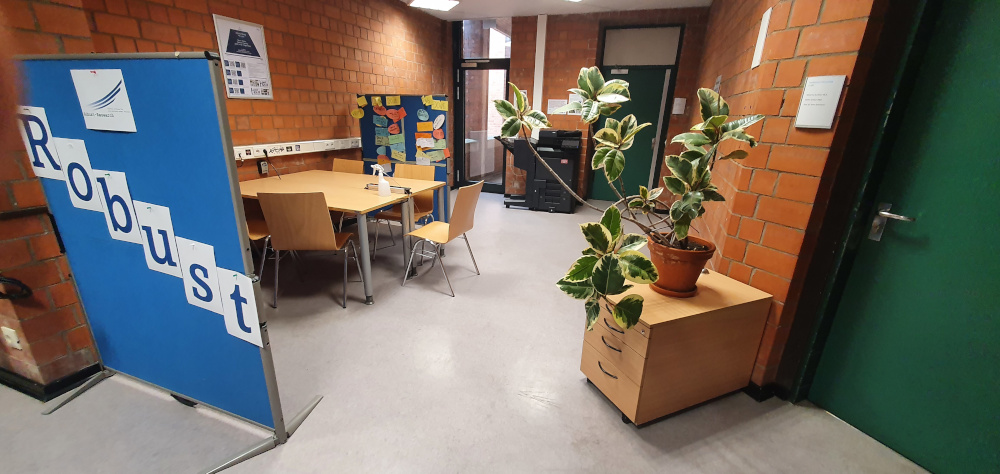

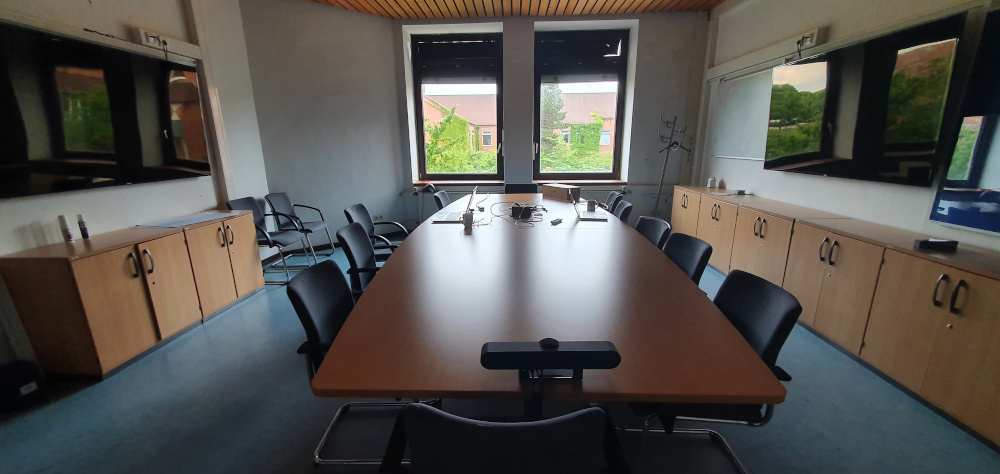
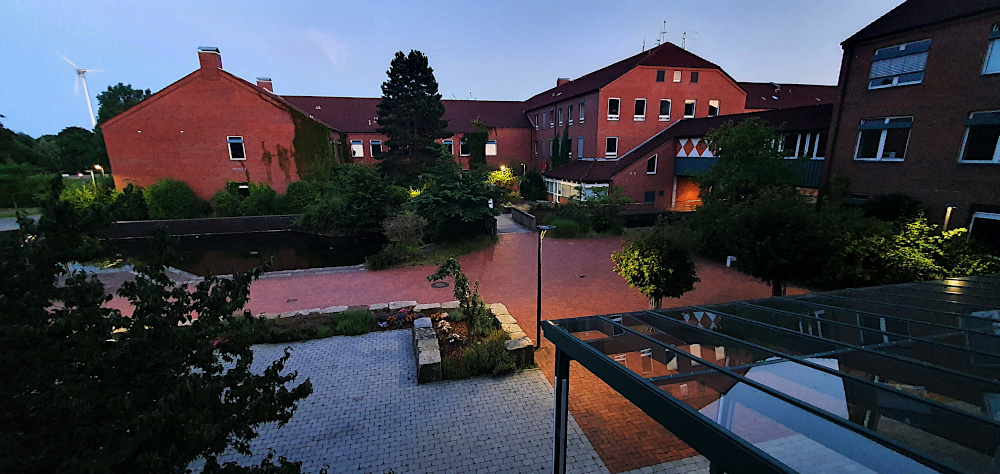

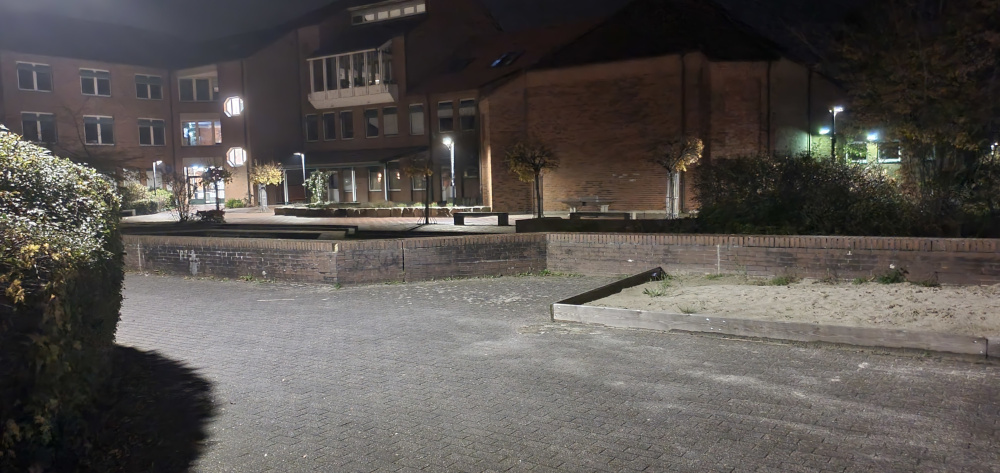
Bernd Neumann,